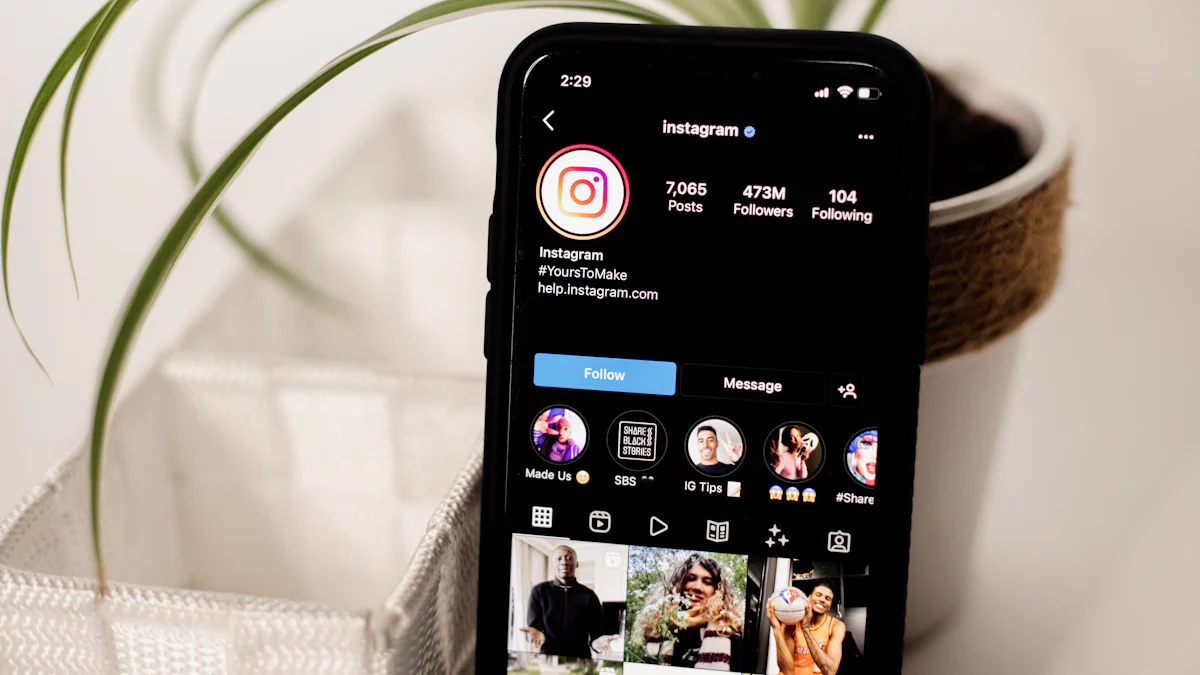Unlocking the Potential of Brand Ambassadors

Brand ambassadors and brand ambassador programs hold the key to unlocking your brand's potential. They can significantly boost your brand visibility and engagement. Imagine reaching an average of 10,000 people monthly through social media and blogs. This is the power of a dedicated brand ambassador. They don't just increase brand awareness by 15% annually; they create authentic connections with your target audience. These ambassadors generate excitement and trust, leading to an average of $5,000 in sales revenue per month. By fostering genuine relationships, brand ambassadors enhance your brand's credibility and drive growth.
Understanding the Role and Brand Ambassador
Brand ambassadors serve as the face and voice of your brand. They embody your brand's values and mission, creating a bridge between your company and your audience. Their primary responsibility is to foster genuine connections with potential customers, enhancing brand loyalty and trust. By sharing their experiences and insights, they humanize your brand, making it more relatable and approachable.
Definition and Responsibilities
A brand ambassador is someone who represents and promotes your brand in a positive light. They engage with your audience, both online and offline, to increase brand awareness and drive sales. Their responsibilities include:
- Creating Engaging Content: They produce authentic content that resonates with your audience, whether through blog posts, social media updates, or live events.
- Building Trust: By sharing personal stories and experiences, they build trust and credibility for your brand.
- Influencing Purchase Decisions: Their recommendations can significantly impact consumer choices, leading to increased sales and brand loyalty.
Types of Brand Ambassadors
Brand ambassadors come in various forms, each bringing unique strengths to your marketing strategy.
Celebrity Ambassadors
Celebrity ambassadors leverage their fame and influence to promote your brand. They can reach a vast audience quickly, making them ideal for large-scale campaigns. However, it's crucial to ensure that their image aligns with your brand values to maintain authenticity.
Influencer Ambassadors
Social media influencers have become powerful brand ambassadors. They possess the ability to connect with niche audiences on a personal level. Their followers trust their opinions, making them effective in driving engagement and conversions. Collaborating with influencer ambassadors allows you to tap into their established communities and expand your reach.
Employee Ambassadors
Employee brand ambassadors are your internal champions. They know your brand inside out and can authentically share its story. By empowering your employees to become brand advocates, you create a genuine connection with your audience. Employee brand ambassadors can also enhance your employer branding, attracting top talent to your organization.
Expert Testimony:
Faster Capital, a leader in marketing and branding, emphasizes that brand ambassadors play a crucial role in nurturing brand loyalty by building trust, amplifying brand awareness, and influencing purchase decisions. Their creativity and ability to connect with consumers on a personal level make them invaluable assets in elevating marketing campaigns.
Incorporating brand ambassadors into your marketing strategy can unlock new opportunities for growth and engagement. Whether you choose celebrity, influencer, or employee brand ambassadors, each type offers distinct advantages that can elevate your brand's presence and impact.
Analyzing the Effectiveness of Brand Ambassadors
To truly harness the power of brand ambassadors, you must analyze their effectiveness. This involves understanding how they impact your brand's visibility, engagement, and sales. By focusing on key performance indicators (KPIs), you can measure the success of your brand ambassador programs and optimize them for better results.
Key Performance Indicators (KPIs)
KPIs are essential for evaluating the success of your brand ambassador campaigns. They provide measurable data that reflects the value brand ambassadors bring to your organization.
Reach and Impressions
Reach and impressions are critical metrics. They show how many people see your brand's message. Brand ambassadors can significantly increase these numbers by sharing your content with their followers. This expanded reach enhances brand awareness and helps you tap into new audiences.
Engagement Rates
Engagement rates measure how actively your audience interacts with your content. Brand ambassadors create engaging content that resonates with their followers. This leads to higher likes, comments, and shares. By tracking engagement rates, you can assess how well your ambassadors connect with your target audience.
Conversion Metrics
Conversion metrics track actions like website visits, sign-ups, and purchases. Brand ambassadors influence purchase decisions by building trust and credibility. Monitoring these metrics helps you determine the effectiveness of brand ambassadors in driving sales and achieving your business goals.
Case Studies of Successful Brand Ambassador Campaigns
Examining successful brand ambassador campaigns provides valuable insights. These case studies highlight strategies that have worked well and offer inspiration for your own initiatives.
-
Nike's Collaboration with Athletes: Nike partners with athletes who embody their brand values. These ambassadors create engaging content that showcases Nike products in action. This approach has led to increased brand awareness and sales.
-
Glossier's Use of Influencers: Glossier leverages social media influencers to promote their beauty products. These influencers create authentic content that resonates with their followers. As a result, Glossier has seen a significant boost in engagement and conversions.
-
Starbucks' Employee Ambassadors: Starbucks encourages employees to share their experiences on social media. This strategy humanizes the brand and fosters a sense of community. It has also improved brand recognition and customer loyalty.
By analyzing these KPIs and learning from successful campaigns, you can maximize the effectiveness of brand ambassadors. This will lead to increased brand visibility, engagement, and sales.
Common Pitfalls and How to Avoid Them
When you engage brand ambassadors, you open doors to new opportunities. However, you must navigate potential pitfalls to ensure success. Understanding these challenges helps you maintain a positive brand image and build trust with your audience.
Misalignment with Brand Values
Choosing the right ambassador is crucial. If an ambassador's personal brand doesn't align with your company's values, it can lead to consumer distrust. Imagine a scenario where an ambassador behaves poorly. This reflects negatively on your brand, causing potential backlash. To avoid this, select ambassadors who share your brand's mission and values. Look for individuals with a positive public image and respect within their industry. This alignment ensures that their promotion feels natural and believable, enhancing your brand's credibility.
Lack of Authenticity
Authenticity is key in ambassador marketing. Consumers can easily spot insincerity. If an ambassador lacks genuine affinity for your brand, their promotion may seem forced. This can diminish the impact of your campaign. To combat this, choose ambassadors who genuinely love your products or services. Their enthusiasm will resonate with your audience, helping to build trust and increase brand awareness. Encourage them to share personal stories and experiences, making their endorsements more relatable and impactful.
Over-reliance on Ambassadors
While brand ambassadors are valuable assets, relying too heavily on them can be risky. A single mistake from a well-known ambassador can quickly impact your brand's reputation. Diversify your marketing strategy to mitigate this risk. Use ambassadors as part of a broader plan that includes other marketing channels. This approach ensures that your brand remains resilient, even if an ambassador faces challenges. By balancing your efforts, you maintain control over your brand's narrative and continue to build trust with your audience.
By understanding and addressing these common pitfalls, you can maximize the benefits of brand ambassadors. This strategic approach will help you maintain a strong brand image and foster lasting connections with your audience.
Measuring ROI and Conducting Cost-Benefit Analysis
Understanding the return on investment (ROI) of brand ambassador programs is crucial for maximizing their potential. You need to evaluate how these programs contribute to your brand's growth and profitability. By conducting a thorough cost-benefit analysis, you can make informed decisions that enhance your marketing strategy.
Calculating ROI for Brand Ambassador Programs
Calculating ROI for brand ambassador programs involves assessing the financial returns generated by these initiatives. You should consider both direct and indirect contributions to your sales revenue. For instance, brand ambassadors have been known to generate an average of $5,000 in sales revenue per month through referrals. This translates to a 30% increase in sales revenue over the past year.
To calculate ROI, follow these steps:
-
Identify Total Revenue Generated: Determine the total sales revenue attributed to brand ambassador activities. Include direct sales from referrals and any indirect sales influenced by increased brand awareness.
-
Calculate Total Costs: Account for all expenses related to the brand ambassador program. This includes compensation, training, marketing materials, and any other associated costs.
-
Apply the ROI Formula: Use the formula:
[ \text{ROI} = \left(\frac{\text{Total Revenue} - \text{Total Costs}}{\text{Total Costs}}\right) \times 100 ]
This calculation will give you a percentage that represents the financial return on your investment in brand ambassador programs.
Cost-Benefit Analysis Techniques
Conducting a cost-benefit analysis helps you weigh the advantages of brand ambassador programs against their costs. This analysis provides a comprehensive view of the program's value to your brand.
-
List All Benefits: Identify all the benefits your brand ambassador programs offer. These may include increased brand awareness, improved customer satisfaction, and enhanced brand loyalty. Surveys indicate that brand ambassadors significantly impact brand awareness and purchase decisions.
-
Quantify Benefits: Assign a monetary value to each benefit. For example, calculate the revenue generated from increased sales or the cost savings from improved customer retention.
-
Compare Costs and Benefits: Subtract the total costs from the total benefits to determine the net gain. A positive result indicates that the benefits outweigh the costs, justifying the investment in brand ambassador programs.
By measuring ROI and conducting a cost-benefit analysis, you can optimize your brand ambassador programs for maximum impact. This strategic approach ensures that you allocate resources effectively and achieve your business objectives.
Impact on Sales and Engagement

Brand ambassadors can significantly influence your sales and engagement metrics. They not only boost your brand's visibility but also drive tangible results in terms of revenue and customer interaction. Understanding the short-term and long-term benefits of brand ambassadors will help you maximize their impact on your business.
Short-term vs. Long-term Benefits
In the short term, brand ambassadors can create an immediate buzz around your products or services. They generate excitement and attract attention, leading to a quick increase in sales. For instance, ambassadors have been known to generate an average of $5,000 in sales revenue per month through direct or indirect referrals. This immediate boost can be crucial for product launches or promotional events.
However, the true power of brand ambassadors lies in their ability to deliver long-term benefits. By fostering authentic relationships with your audience, they enhance customer retention and build a loyal community around your brand. This sustained engagement leads to a 30% increase in sales revenue over the past year, as ambassadors continue to influence purchase decisions and maintain interest in your offerings.
Strategies for Maximizing Sales Impact
To fully leverage the potential of brand ambassadors, you need to implement strategies that maximize their impact on sales. Here are some effective approaches:
-
Set Clear Objectives: Define specific goals for your brand ambassador program. Whether it's increasing sales, boosting community engagement, or enhancing brand awareness, having clear objectives will guide your efforts and measure success.
-
Track Key Metrics: Monitor conversion rates, website traffic, and social media engagement to evaluate the effectiveness of your ambassadors. By comparing sales data before and after their involvement, you can assess their direct impact on sales growth and profitability.
-
Encourage Authentic Content: Empower your ambassadors to share genuine experiences and stories about your brand. Authentic content resonates with audiences and builds trust, leading to higher engagement and conversions.
-
Diversify Ambassador Types: Utilize a mix of celebrity, influencer, and employee ambassadors to reach different segments of your target audience. Each type brings unique strengths that can enhance your marketing strategy and expand your reach.
-
Foster Long-term Relationships: Invest in building lasting partnerships with your ambassadors. Long-term collaborations create a sense of loyalty and commitment, resulting in consistent promotion and sustained sales impact.
By implementing these strategies, you can harness the full potential of brand ambassadors to drive sales and engagement. Their influence will not only boost your immediate revenue but also contribute to long-term business growth and success.
Factors Influencing Effectiveness of Brand Ambassadors
Authenticity and Credibility
You must prioritize authenticity when selecting brand ambassadors. Genuine ambassadors resonate with audiences. They share real experiences and stories. This builds trust and credibility. Consumers value honesty. They can easily detect insincerity. When ambassadors genuinely love your brand, their enthusiasm becomes contagious. This authenticity enhances their influence. It encourages followers to engage and make purchases. Choose ambassadors who naturally align with your brand's mission. Their credibility will amplify your message and foster lasting connections.
Alignment with Brand Values
Your brand values define your identity. Ambassadors should reflect these values. Misalignment can confuse consumers. It may even damage your reputation. Ensure that ambassadors embody your core principles. This alignment creates a seamless connection between your brand and its representatives. When ambassadors share your vision, their promotions feel natural. This consistency strengthens your brand image. It also reinforces your message. Select ambassadors who genuinely support your mission. Their alignment will enhance your brand's integrity and appeal.
Audience Relevance
Understanding your target audience is crucial. Ambassadors must connect with this audience. Relevance ensures that your message reaches the right people. Choose ambassadors who share interests with your target market. Their influence will resonate more effectively. This relevance increases engagement and conversion rates. It also helps you tap into new segments. By selecting ambassadors who align with your audience, you maximize your marketing impact. Their connection with followers will drive meaningful interactions and boost your brand's visibility.
Role of Brand Ambassadors in Different Business Sizes
Small Businesses
For small businesses, brand ambassadors can be a game-changer. You might not have the budget for large-scale advertising campaigns, but ambassadors can help you reach your target audience effectively. They add a personal touch to your brand, making it more relatable and human. By sharing their genuine experiences and stories, ambassadors make your brand tangible and trustworthy. This approach can significantly increase your brand awareness and sales.
Small businesses often benefit from ambassadors who have a strong connection with niche audiences. These ambassadors understand your products and can promote them authentically. Their expertise ensures that they communicate your brand's message effectively, influencing opinions and purchasing decisions. By leveraging ambassadors, you can tap into new markets and grow your customer base without breaking the bank.
Medium-sized Enterprises
Medium-sized enterprises can use brand ambassadors to scale their marketing efforts. As your business grows, maintaining a personal connection with your audience becomes challenging. Ambassadors bridge this gap by adding a human touch to your brand. They engage with your audience on a personal level, fostering loyalty and trust.
For medium-sized businesses, a mix of influencer and employee ambassadors can be effective. Influencers help you reach broader audiences, while employee ambassadors provide an insider's perspective. This combination enhances your brand's credibility and appeal. By strategically selecting ambassadors who align with your brand values, you ensure that your message resonates with your target audience.
Large Corporations
Large corporations often face the challenge of appearing impersonal. Brand ambassadors can humanize your brand, making it more approachable and relatable. They share personal stories and emotions related to your products, creating a connection with consumers. This strategy not only increases brand awareness but also strengthens customer loyalty.
In large corporations, celebrity ambassadors can amplify your brand's reach. Their influence can quickly attract attention and drive sales. However, it's crucial to choose celebrities who genuinely align with your brand values to maintain authenticity. Additionally, incorporating employee ambassadors can enhance your employer branding, attracting top talent and fostering a positive work culture.
By understanding the role of brand ambassadors in different business sizes, you can tailor your strategy to maximize their impact. Whether you're a small business or a large corporation, ambassadors offer unique opportunities to connect with your audience and drive growth.
Future Trends in Brand Ambassadorship

Emerging Trends and Technologies
In the ever-evolving landscape of brand ambassadorship, staying ahead of emerging trends and technologies is crucial. You must embrace these advancements to maintain a competitive edge and effectively engage your audience.
-
Social Media Evolution: Social media platforms continue to evolve, offering new features and opportunities for brand ambassadors. Platforms like TikTok and Instagram Reels have gained immense popularity, allowing ambassadors to create short, engaging videos that capture attention quickly. You should leverage these platforms to reach younger audiences and showcase your brand in creative ways.
-
Augmented Reality (AR) and Virtual Reality (VR): AR and VR technologies are transforming how consumers interact with brands. Ambassadors can use these technologies to provide immersive experiences, allowing customers to visualize products in real-world settings. This enhances engagement and helps potential buyers make informed decisions.
-
Data-Driven Insights: Data analytics play a pivotal role in understanding consumer behavior and preferences. By analyzing data, you can identify trends and tailor your brand ambassador strategies accordingly. This ensures that your ambassadors deliver content that resonates with your target audience, maximizing impact and driving conversions.
-
Sustainability and Ethical Practices: Consumers increasingly prioritize sustainability and ethical practices. Ambassadors who align with these values can enhance your brand's reputation and appeal. You should collaborate with ambassadors who advocate for environmental and social causes, reinforcing your commitment to responsible business practices.
Predictions for the Future
Looking ahead, several predictions indicate how brand ambassadorship will evolve. You must prepare for these changes to capitalize on future opportunities.
-
Increased Personalization: Personalization will become a key focus in brand ambassadorship. Consumers expect tailored experiences that cater to their individual needs and preferences. Ambassadors will play a vital role in delivering personalized content, fostering deeper connections with your audience.
-
Integration of Artificial Intelligence (AI): AI will revolutionize brand ambassadorship by automating processes and enhancing decision-making. AI-powered tools can analyze vast amounts of data to identify trends and optimize ambassador campaigns. This technology will enable you to make data-driven decisions and improve the effectiveness of your ambassador programs.
-
Rise of Micro-Influencers: Micro-influencers, with smaller but highly engaged audiences, will gain prominence. Their authenticity and relatability resonate with consumers, making them valuable assets for your brand. Collaborating with micro-influencers allows you to tap into niche markets and build genuine connections with your target audience.
-
Focus on Long-Term Partnerships: Long-term partnerships with brand ambassadors will become more prevalent. Building lasting relationships fosters loyalty and trust, resulting in consistent promotion and sustained impact. You should invest in nurturing these partnerships to create a sense of commitment and mutual benefit.
By embracing these emerging trends and preparing for future developments, you can unlock the full potential of brand ambassadorship. This strategic approach will ensure that your brand remains relevant, engaging, and successful in an ever-changing market.
Brand ambassadors offer numerous benefits that can transform your business. They enhance visibility, foster authentic connections, and drive sales. By leveraging brand ambassadors, you can tap into new markets and boost engagement. Their influence helps you build trust and credibility with your audience. Now is the time to explore brand ambassador programs. Implementing these strategies will optimize your marketing efforts and ensure financial rewards. Take action today and unlock the potential of brand ambassadors for your brand's success.
FAQ
What is a Brand Ambassador?
A Brand Ambassador is someone who promotes a company's products or services. They do this through public appearances, social media, and other advertising methods. Often, they are paid to represent the brand, boosting recognition and loyalty. While celebrities and influencers frequently take on this role, everyday people can also become brand ambassadors.
How do I become a Brand Ambassador?
To become a brand ambassador, you should reach out to brands you admire. You can email them directly or search for open positions on job sites. When applying, highlight your enthusiasm for the brand and the qualities that make you an ideal candidate. Include a resume and any relevant work samples to showcase your skills.
What skills do I need to be a Brand Ambassador?
To excel as a brand ambassador, you need several key skills:
- Excellent communication skills: You must effectively convey your message to diverse audiences.
- Creativity: Craft engaging content that resonates with your audience.
- Social media savvy: Navigate platforms to maximize reach and engagement.
- Passion for the brand: Genuine enthusiasm helps build trust and credibility.
Why are Brand Ambassadors important for businesses?
Brand ambassadors play a crucial role in enhancing brand visibility and engagement. They create authentic connections with the target audience, fostering trust and loyalty. By sharing personal experiences, they humanize the brand, making it more relatable and approachable.
Can anyone become a Brand Ambassador?
Yes, anyone with a passion for a brand and the right skills can become a brand ambassador. While celebrities and influencers often fill these roles, everyday individuals with a strong connection to the brand can also succeed. Your unique perspective and genuine enthusiasm can make you a valuable asset to any brand.
How do Brand Ambassadors impact sales?
Brand ambassadors significantly influence sales by generating excitement and trust around products. Their recommendations can sway consumer decisions, leading to increased sales and brand loyalty. By fostering genuine relationships, they enhance the brand's credibility and drive growth.
What types of Brand Ambassadors exist?
Brand ambassadors come in various forms, each offering unique strengths:
- Celebrity Ambassadors: Leverage fame to promote brands to large audiences.
- Influencer Ambassadors: Connect with niche audiences on a personal level.
- Employee Ambassadors: Share insider perspectives and enhance employer branding.
How do companies measure the success of Brand Ambassadors?
Companies use Key Performance Indicators (KPIs) to evaluate brand ambassador success. These include:
- Reach and Impressions: Measure how many people see the brand's message.
- Engagement Rates: Track audience interaction with content.
- Conversion Metrics: Monitor actions like website visits and purchases.
What are the benefits of using Brand Ambassadors?
Brand ambassadors offer numerous benefits, including:
- Increased brand awareness: Reach wider audiences through authentic promotion.
- Enhanced credibility: Build trust with genuine endorsements.
- Improved customer loyalty: Foster lasting connections with the audience.
How do Brand Ambassadors differ from Influencers?
While both promote brands, brand ambassadors typically have a long-term relationship with the company. They embody the brand's values and mission, creating a consistent and authentic representation. Influencers, on the other hand, may engage in short-term collaborations focused on specific campaigns.
See Also
Guide to Achieving Success as a Brand Ambassador
Key Skills Every Brand Ambassador Needs in 2024
Deciding on Influencers Versus Brand Ambassadors
Comparative Overview of Brand Ambassador Salaries by Industry
